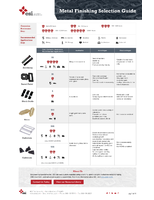UHF Devices extend range of wireless car access systems.
Press Release Summary:
Supplied in 32-pin, 5 x 5 mm QFN package, sub-1 GHz CC11x1-Q1 Series transmitters, receivers, and transceivers have RF design and SPI that eliminate need for external filters or switches. Devices allow migration from unidirectional to bidirectional systems and support operation up to +125°C. They help designers build reliable data links with fast frequency hopping scheme (88 µs switching time) utilizing fractional-N concept, and data rate is programmable from 1.2-250 kBaud.
Original Press Release:
TI Brings Low Power and High-Distance Range to Wireless Car Access Systems with Low-Cost UHF Device Family
New CC11x1-Q1 family provides increased visibility for vehicle safety and maintenance with simple RF design and an easy-to-use SPI interface
DALLAS (October 13, 2009) - Consumers demand timely visibility into their vehicle status to ensure their car is properly maintained resulting in today's vehicle architecture containing a wide range of wireless applications such as tire pressure monitoring, auxiliary heating remote control and key features such as garage door openers or the standard remote control. In order to meet the various needs required by these wireless systems, Texas Instruments Incorporated (TI) (NYSE: TXN) today announced the low-cost, sub-1GHz CC11x1-Q1 device family. Designed for very low-power, high-range wireless and car access systems, this new device family includes UHF transmitters, receivers and transceivers. With a simple RF design and an easy-to-use SPI interface, the CC11x1-Q1 family does not require external filters or switches which results in a low-cost design. For more information, visit www.ti.com/cc11x1_prauto.
Key features and benefits of the CC11x1-Q1
Pricing and availability
Pricing of the CC11x1-Q1 device family starts at $1.10 for 100k of the CC1151IRHBRG4Q1. These devices are available in a QFN 5x5mm, 32-pin package, resulting in the smallest board space for UHF transceivers on the market. For additional questions and support, visit www.ti.com/rfid_support.
Find out more about TI's CC11x1-Q1 device family by visiting the links below:
About Texas Instruments
Texas Instruments (NYSE: TXN) helps customers solve problems and develop new electronics that make the world smarter, healthier, safer, greener and more fun. A global semiconductor company, TI innovates through design, sales and manufacturing operations in more than 30 countries. For more information, go to www.ti.com.
Trademarks
All registered trademarks and other trademarks belong to their respective owners.




